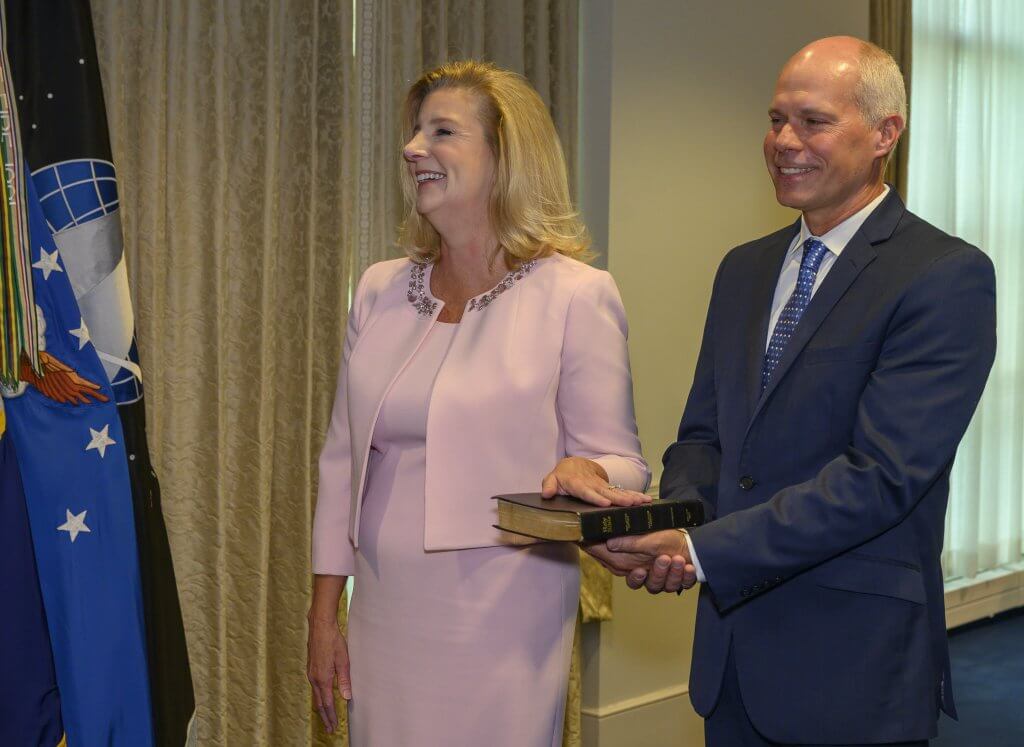The Army had a busy year – and its performance was outstanding, Secretary of the Army Christine Wormuth said while reflecting on her first year as the branch’s top civilian official.
“Everything is a team sport in the Army,” she said, so she wouldn’t take personal credit for the branch’s achievements. Instead, she praised the Army’s continued role in COVID-19 recovery – from the National Guard providing assistance in their communities to behind-the-scenes work of getting vaccines to the public. She also commended the Army’s work in the evacuation efforts from Afghanistan, and standing up what amounts to five installations around the United States to house tens of thousands of refugees.
Looking forward, Wormuth released a list of objectives in February that, she wrote, should guide the Army toward “specific and tangible outcomes.” The first – putting the Army on a sustainable strategic path – comes from shifting focus away from the Middle East and counterterrorism to emerging threats like Russia and China. The Regionally Aligned Readiness and Modernization Model (ReARMM), which is due to be implemented Oct. 1, supports this by getting new equipment and weapons systems to units. It should also provide soldiers in the reserve components with more predictability, she said; for example, the Guard will be on a five-year cycle under ReARMM.
The Reserve’s 75th Innovation Command, which is working with Futures Command to scout cyber and technology experts, is on track to make the Army more data-centric, Wormuth’s second objective.
“That’s a good example of where we’re able to draw on folks who have particular skill sets from their civilian lives and leverage them through their service in the reserves,” Wormuth said.
The Guard knows better than anyone the importance of the third objective, building resiliency against climate change, she said. Beyond the Guard’s response to natural disasters, flooding due to rising sea levels has cost millions of dollars in damage to installations. Soldiers in all three components will need to train to operate in extreme temperatures.
Wormuth’s last three objectives – building positive command climates, reducing harmful behaviors and adapting recruiting and retention – all focus on the Army’s people. She said the Kentucky National Guard stands out for its focus on soldiers’ well-being, and that was reflected in good reviews in a Department of Defense-level survey. Wormuth said Lt. Gen. Jon Jensen, director of the Army National Guard and Lt. Gen. Jody Daniels, chief of the Army Reserve, are working to help Guard and reserve commanders overcome geographic and time challenges to building unit cohesion.
Fusion Directorates, a pilot sexual harassment and assault prevention program that brings together support services outside of the chain of command, is showing promise. The 99th Readiness Division will launch the first virtual pilot in the reserve component this summer, covering all soldiers in the 99th RD’s 13-state region. Wormuth said she visited Fort Sill’s program and can see it being scaled up.
But none of the other objectives can be met without great soldiers. The “Know Your Army” advertising campaign, launched in April, touts benefits like home-buying aid and paid leave to compete with civilian employers. The Parenthood, Pregnancy and Postpartum Army directive that Wormuth signed April 21, 2022, will help more parents be able to stay in the service. The policies emerged from a Facebook group; Wormuth’s team invited input from the members, who spanned the Army’s ranks and components.
“It’s not only a great set of policy changes,” Wormuth said, “but I think it’s a real demonstration of the fact that people on the ground can actually be change agents.”
Unique insight to reserve component
Wormuth said she brings a total Army perspective to her role, but she does have unique insight into the needs of the reserve component. She served as a senior fellow at the Center for Strategic and International Studies, and was the principal author on its “The Future of the National Guard and Reserves” 2006 report. Wormuth’s sister is a surgeon in the Army Reserve and her stepson-in-law serves in the National Guard.
There seemed to be an “us versus them” mentality between the active-duty Army and its reserve counterparts when Wormuth started working in defense and national security policy, she said. But working together on deployments seems to give soldiers across the components a chance to build mutual respect.
“My hope is that the bridge building that happened over the last 20 years, between the three components, will remain,” she said.

